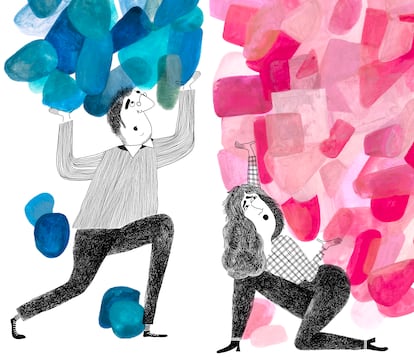Gender equality: A challenge that also affects mental health
Biological factors and social stereotypes contribute to inequalities between men and women in mental health and its treatment

Statistics show that women have a higher prevalence of mental health problems. Anxiety disorders, for example, affect 10% of the Spanish population, and account for twice as many cases in women (14%) as in men (7%), according to the National Health Survey in Spain 2023. In consultations and studies, it is clear that cultural stereotypes influence the way in which men and women process and cope with psychological suffering.
What’s more, men and women often express their emotional distress in different ways, as noted by clinical psychologist Isabel Cuéllar. Women usually exhibit internalized symptoms, such as depression, anxiety, or somatic disorders, while men tend to express emotional distress through externalized behaviors, including addictions, behavioral issues, higher suicide rates, impulse control disorders, and neurodevelopmental conditions.
Different explanations have been explored to explain these differences. On the one hand, there are constitutional, genetic or endocrine factors. Hormonal changes, for instance, play a key role in the risk of depression and anxiety. After menopause, when estrogen levels become low and stable, the risk of depression in women decreases, aligning more closely with that of men in the same age group.
Beyond biology, there are environmental variables — such as socially imposed roles and behavioral patterns — that condition the way in which men and women perceive and deal with psychological suffering. In other words, it is not just sex but gender that directly influences a person’s experiences, as psychiatrist Gemma Parramon explains. From an early age, boys and girls are socialized differently through family dynamics, education, friendships, the media, social networks, and cultural norms, which can affect their ability to recognize and express their emotional struggles.
Boys are often encouraged to be strong and avoid showing vulnerability, which can lead them to suppress their emotions. This socialization makes men more likely to avoid seeking help, even from those closest to them. What’s more, they may rely on maladaptive coping mechanisms such as avoidance, escape, social isolation, substance abuse, risky behaviors, irritability, and an increase in work hours as adults.
On the other hand, girls are typically encouraged to express their emotions and develop interpersonal skills. They are taught that seeking emotional support is acceptable. However, the high expectations placed on them can sometimes make their desires seem unattainable, leading to feelings of low self-esteem, guilt, or shame. This feminine ideal contributes to many mental health challenges and is one of the reasons why disorders like anorexia and bulimia are up to six times more common in women than in men. Additionally, women are often assigned the role of caregiver, which, combined with the expectation of working outside the home, leads to an overload of responsibilities. This burden leaves little time for personal needs such as leisure, self-care, diet, physical activity, sleep, and social relationships — all of which are crucial for maintaining good mental health.
Women, across all countries, ethnicities, and life stages, are twice as likely as men to seek support for mental health problems. In contrast, men often underestimate their distress, even when they experience significant symptoms. The clinical response they receive can also differ; research indicates that women are more likely to leave a doctor’s office with a prescription for psychotropic drugs than men. Additionally, men’s symptoms may not be recognized as easily, as they might present as irritability rather than sadness in cases of depression. Studies also show that greater gender inequality correlates with greater disparities in mental health treatment.
The intersection of gender inequality and mental health is complex, which is why it is crucial to promote changes in political, cultural, and healthcare sectors. To address the issues, different strategies could be developed. At the policy level, public initiatives should aim to eliminate factors that contribute to poorer mental health among women, such as sexual violence, gender-based violence, the burden of caregiving, and higher levels of poverty. Policies should also focus on combating discrimination in the labor market and supporting shared family and social responsibilities. In healthcare, it’s vital to train professionals and raise awareness about how unconscious biases can contribute to gender disparities in treatment. Clinical interventions should promote healthy and equitable coping strategies for both genders. Socially, there should be a focus on raising awareness about the importance of mental health from an early age, teaching individuals how to detect emotional problems, and encouraging both men and women to seek help when needed.
Sign up for our weekly newsletter to get more English-language news coverage from EL PAÍS USA Edition
Tu suscripción se está usando en otro dispositivo
¿Quieres añadir otro usuario a tu suscripción?
Si continúas leyendo en este dispositivo, no se podrá leer en el otro.
FlechaTu suscripción se está usando en otro dispositivo y solo puedes acceder a EL PAÍS desde un dispositivo a la vez.
Si quieres compartir tu cuenta, cambia tu suscripción a la modalidad Premium, así podrás añadir otro usuario. Cada uno accederá con su propia cuenta de email, lo que os permitirá personalizar vuestra experiencia en EL PAÍS.
¿Tienes una suscripción de empresa? Accede aquí para contratar más cuentas.
En el caso de no saber quién está usando tu cuenta, te recomendamos cambiar tu contraseña aquí.
Si decides continuar compartiendo tu cuenta, este mensaje se mostrará en tu dispositivo y en el de la otra persona que está usando tu cuenta de forma indefinida, afectando a tu experiencia de lectura. Puedes consultar aquí los términos y condiciones de la suscripción digital.








































